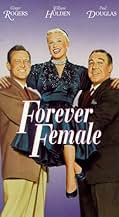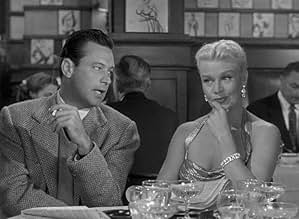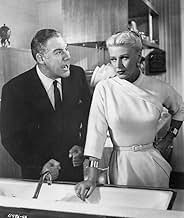An aging actress refuses to admit she is too old to play the ingénue role anymore.An aging actress refuses to admit she is too old to play the ingénue role anymore.An aging actress refuses to admit she is too old to play the ingénue role anymore.
- Director
- Writers
- Stars
- Awards
- 1 win total
Marion Ross
- Patty
- (as Marian Ross)
Brandon Beach
- Diner at Sardi's
- (uncredited)
Paul Bradley
- Actor in Play
- (uncredited)
James Carlisle
- Diner at Sardi's
- (uncredited)
Steve Carruthers
- Theatre Patron
- (uncredited)
Oliver Cross
- Club Patron
- (uncredited)
- Director
- Writers
- All cast & crew
- Production, box office & more at IMDbPro
Featured reviews
A young and cynical writer (William Holden) criticises a stage star who is advancing in years but still popular (Ginger Rogers). In time he begins a relationship with her after he sells his own play to her ex-husband (Paul Douglas). A younger and upcoming actress (Pat Crowley) is also attracted to him and believes a part given to the older actress would be better suited to her.
Based off the play 'Rosalind' by JM Barrie and adapted for the screen by Julius J. and Philip G. Epstein, this film seems to have pretensions at being like ALL ABOUT EVE (1950), but this film it ain't. As a romantic comedy it's okay, but is unlikely to set the world on fire, despite the strengths of the two leads and a good performance by Douglas as the still cuckold ex who gets some of the best dialogue
Based off the play 'Rosalind' by JM Barrie and adapted for the screen by Julius J. and Philip G. Epstein, this film seems to have pretensions at being like ALL ABOUT EVE (1950), but this film it ain't. As a romantic comedy it's okay, but is unlikely to set the world on fire, despite the strengths of the two leads and a good performance by Douglas as the still cuckold ex who gets some of the best dialogue
This film was made in the shadow of ALL ABOUT EVE, and paints a more benign view of that film's central situation. Ginger Rogers plays a leading Broadway star, who retains a close relationship with her former husband (Paul Douglas), and works closely with playwright William Holden (possibly a softer build-up for his play director in Bing Crosby's/Grace Kelly's THE COUNTRY GIRL). Pat Crowley, a younger woman of some acting talent, is trying to break into the circles that cast and produce Broadway plays (she is doing mostly off-Broadway work). The relationship of these four characters are the basis of this comedy.
There are differences between the situation here and the situation in EVE. There was more of an atmosphere of the theater and it's traditions in EVE (because Joseph Mankiewicz writes literate scripts, and was determined to show what goes on behind the stage curtains). But there Bette Davis has gotten trapped into a lonely greatness on stage, and she turns out to be willing to vacate her pedestal if she can have a human life with Gary Merrill. She just does not like the way Anne Baxter is trying to replace her in her parts - Baxter's underhanded methods are despicable. Crowley is not Baxter. She genuinely admires Rogers, and just wants entry (which she may get through Holden). It is just that Rogers is still clinging to her youth - Holden is her last chance for such a cling when they go out together. But even Rogers realizes that she is beyond the point of return. In fact, towards the end of the film the audience and Holden and Crowley discover that Rogers actually gives herself a long summer vacation where she can wear softer, easier clothing and eat as much as she wants to. In the end she accepts that the scepter is passed, but she still has her old husband/friend/and continuous argument partner Douglass to play with.
There are differences between the situation here and the situation in EVE. There was more of an atmosphere of the theater and it's traditions in EVE (because Joseph Mankiewicz writes literate scripts, and was determined to show what goes on behind the stage curtains). But there Bette Davis has gotten trapped into a lonely greatness on stage, and she turns out to be willing to vacate her pedestal if she can have a human life with Gary Merrill. She just does not like the way Anne Baxter is trying to replace her in her parts - Baxter's underhanded methods are despicable. Crowley is not Baxter. She genuinely admires Rogers, and just wants entry (which she may get through Holden). It is just that Rogers is still clinging to her youth - Holden is her last chance for such a cling when they go out together. But even Rogers realizes that she is beyond the point of return. In fact, towards the end of the film the audience and Holden and Crowley discover that Rogers actually gives herself a long summer vacation where she can wear softer, easier clothing and eat as much as she wants to. In the end she accepts that the scepter is passed, but she still has her old husband/friend/and continuous argument partner Douglass to play with.
This is a very good film that manages to entertain even though one of the characters was atrociously written. The film begins with a cocky young playwright (William Holden) being discovered. Although he's managed to offend a famous Broadway star (Ginger Rogers), he's also impressed her with his talent and good looks. The problem is that she wants to star in his play--even though she is WAY too old for the part. Even though they re-write it for her to play a character 10 years older, she still is too old for the part. But he wants the play to be produced and he's also in love with her. What's he to do?! And, what's he to do about Sally Carver--a spunky young actress who would be perfect for the part?
While Holden, Rogers and Paul Douglas all did great because they were real professionals and their parts were well written, I couldn't say the same for Pat Crowley (who played Sally). Although her character was supposed to be very eager and raw, she often came off as annoying and obnoxious. Her constant use of the word 'Siamese' and brash persona really turned me off--as I am sure it did for the audience. It's surprising, since the studio appeared to be grooming her for stardom--and the film's credits point out that she's a new discovery. But, if you can block out her character (at least until she evolves into a REALISTIC person later in the film), you will see a cool film--one that gives Rogers a chance to stretch herself and play a riskier role--an actress whose vanity is getting in the way of common sense. Well worth seeing.
While Holden, Rogers and Paul Douglas all did great because they were real professionals and their parts were well written, I couldn't say the same for Pat Crowley (who played Sally). Although her character was supposed to be very eager and raw, she often came off as annoying and obnoxious. Her constant use of the word 'Siamese' and brash persona really turned me off--as I am sure it did for the audience. It's surprising, since the studio appeared to be grooming her for stardom--and the film's credits point out that she's a new discovery. But, if you can block out her character (at least until she evolves into a REALISTIC person later in the film), you will see a cool film--one that gives Rogers a chance to stretch herself and play a riskier role--an actress whose vanity is getting in the way of common sense. Well worth seeing.
An aging stage star tries to hold on to ingénue roles. The screenplay is by the Epstein twins (Casablanca) based on a play by Barrie (Peter Pan). Given such pedigree, this comedy falls short of expectations but it is fairly enjoyable and has witty dialog. It's helped by good acting from Rogers as the actress in denial about her advancing years, Douglas as her supportive ex-husband, and Holden (on the verge of super-stardom) as a writer. A screen shot at the end of the film touts Crowley as a future star at Paramount. She never became a star, but she went on to have a long TV career, and she is winning here as a perky young actress.
This 1954 film features Ginger Rogers and William Holden with a nice supporting role played by Paul Douglas as Ginger Roger's ex-husband. Ginger Rogers was in her early forties at the time of this film and played an actress not totally accepting of her age. The public still loved her but playing a 29 year old was beginning to strain credibility. William Holden played an unknown playwright with a play featuring the relationship of a 19 year old and her mother. The role was rewritten so that Ginger Rogers could play a 29 year old, once again. Won't go further into the story but I found it interesting that Ginger Rogers was brave enough to play a role like this where age was a focus. It was a surprise to see an older Ginger Rogers after only having seen her earlier movies. Overall this film was entertaining with a nice mix of comedy and drama. Well worth the time to watch.
Did you know
- TriviaSir James M. Barrie's original play, which is a short piece of less than an hour in length, dates from 1912 and is set in a small rural boarding-house "far from London", where a famous actress has elaborately disguised herself as a dowdy middle-aged type in order to escape from adoring admirers and her frantic celebrity lifestyle in the metropolis. As this indicates, this movie adaptation is a very free one.
- GoofsCrux of plot hinges on efforts of a Broadway producer and playwright to find ideal actresses to star in a play about a troubled mother/daughter relationship. Yet when the pair attends a summer stock production of the play, large poster outside theatre only includes photos of actress playing daughter and two male co-stars - completely ignoring actress who plays crucial mother role that's been talked about throughout entire film.
- Quotes
Clara Mootz aka Sally Carver: How many drinks have you had, Mr. Phillips?
E. Harry Phillips: Innumerable. And the fact that I can still say "innumerable" suggests that that's nowhere near enough!
- Crazy creditsIn the end credits, Pat Crowley is billed as "A future Paramount star".
- ConnectionsReferenced in Discovering Film: William Holden (2015)
Details
- Runtime
- 1h 33m(93 min)
- Color
- Aspect ratio
- 1.37 : 1
Contribute to this page
Suggest an edit or add missing content





































